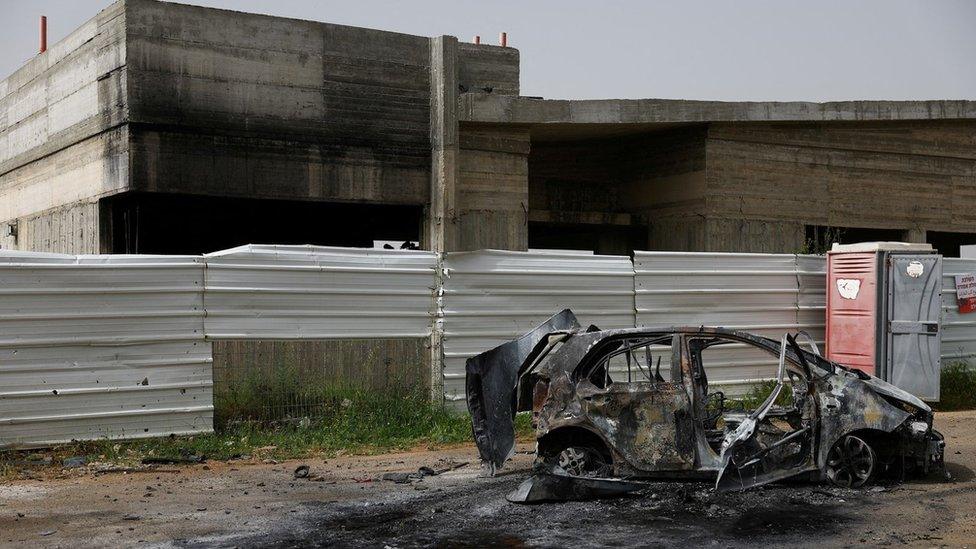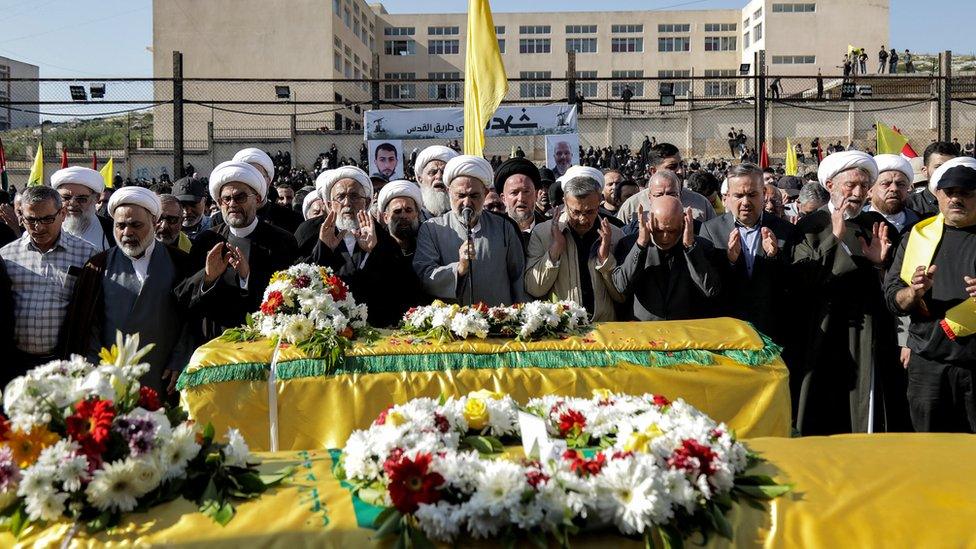Israel and Hezbollah: Fears of escalation after flurry of attacks
- Published

Israeli soldiers were wounded when a building they were in was hit in a Hezbollah attack
Cross-border fighting between Israeli forces and the Lebanese group Hezbollah have intensified in recent days, raising fears of a further escalation.
Hezbollah announced on Thursday the deaths of two fighters, after the Israeli military said it had struck sites in southern and eastern Lebanon.
On Wednesday, 14 Israeli soldiers were wounded in a missile and drone attack.
Hezbollah claimed it was a response to strikes a day earlier that the Israeli military said killed two commanders.
There have been exchanges of fire almost every day since the day after the start of the war between Israel and Hamas in Gaza in October. Hezbollah has said it is acting in support of the Palestinian group. Both are backed by Iran and proscribed as terrorist organisations by Israel, the UK and other countries.
More than 330 people have been killed in Lebanon, including at least 66 civilians, according to Lebanese authorities and the UN, while the Israeli military says 10 soldiers and eight civilians have been killed in Israel.
The hostilities have also displaced tens of thousands of people from border communities in northern Israel and southern Lebanon.
On Thursday morning, Hezbollah's media office put out statements saying that two fighters had been "martyred on the road to Jerusalem" - a phrase it has been using to refer to fighters killed by Israeli fire. It named them as Mohammed Jamil al-Shami and Ali Ahmed Hamada but provided no further details.
Lebanon's state-run National News Agency reported that two people had been killed in an Israeli drone strike in the border village Kfarkela at dawn.
Warplanes had also targeted the nearby village of Khiam with "six strikes and more than 100 artillery and phosphorus shells", it said.
The Israel Defense Forces (IDF) said in a statement that its aircraft had "eliminated two Hezbollah terrorists identified in the area or Kfarkela" overnight.
Fighter jets meanwhile "struck Hezbollah terror targets" in area of Khiam, including infrastructure and military structures, it added. Soldiers also "fired in order to remove an imminent threat" there, according to the statement.
On Wednesday evening, the IDF said jets had struck "significant Hezbollah terrorist infrastructure" used by the group's aerial defence system in northern Baalbek, which is in the Bekaa valley in eastern Lebanon.

Hezbollah supporters attended the funerals of two alleged commanders killed in Israeli air strikes on Tuesday
That came hours after Hezbollah claimed it had carried out an attack that the IDF said injured 14 soldiers, six of them seriously and two moderately.
A number of anti-tank missiles and explosive drones were launched from Lebanese territory towards the Israeli border village of Arab al-Aramshe, according to the IDF.
Israel's Haaretz newspaper reported, external that the attack saw the anti-tank missiles hit a community centre in the Arab Bedouin community and nearby cars, followed by the incursion of two drones, one of which exploded on impact.
It said one of the injured soldiers was in a critical condition and that two members of an emergency response squad and three civilians were also hurt.
The IDF said it struck the sources of the fire, as well as Hezbollah military compounds and infrastructure in the Lebanese towns of Naqoura and Yarine.
Hezbollah said what it had targeted was the headquarters of an Israeli military reconnaissance unit in response to "the enemy's assassination of a number of resistance fighters in Ain Baal and Chehabiyeh".
The IDF said on Tuesday that its aircraft had carried out strikes in those areas which killed Ismail Youssef Baaz, who it said was the commander of Hezbollah's coastal sector in Ain Baal, and Mohammed Hussein Mustafa Shehoury, who it said was the commander of the rockets and missiles unit in the western region for the elite Radwan Force.
A member of that unit, Mahmoud Fadlullah, was killed alongside Shehoury, it added.
While Hezbollah confirmed the deaths of the three men, it did not identify Baaz or Shehoury as commanders.
Fears are growing that the cross-border hostilities will escalate into a wider regional war, particularly after Hezbollah's backer Iran launched more than 300 drones and missiles at Israel over the weekend in retaliation for a deadly strike on the Iranian consulate in Syria earlier this month.
The IDF said 99% of the drones and missiles were shot down by its forces, Western allies and Arab partners, and that an airbase in southern Israel sustained only minor damage when it was hit by four missiles. A young Bedouin girl was injured by shrapnel.
Dozens of rockets were also fired from Lebanon at northern Israel during the attack, while launches were also carried out from Iraq and Yemen, where Iran-backed armed groups operate.
Israel vowed to respond to Iran's unprecedented direct attack, but Western powers have urged restraint.